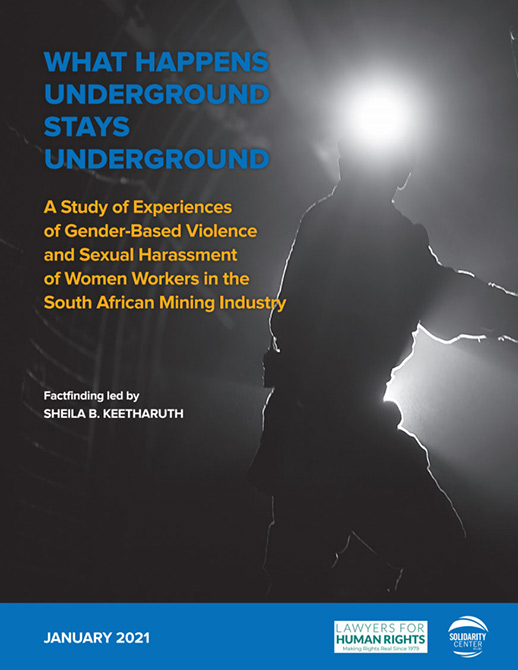Women working in South African mines “at times confront danger, violence and indignity in their work environments,” where gender-based violence and harassment (GBVH) appears both widespread and normalized, according to a new report from the Solidarity Center and South Africa-based Lawyers for Human Rights (LHR).
The report, “What Happens Underground Stays Underground: A Study of Experiences of Gender-Based Violence and Sexual Harassment of Women Workers in the South African Mining Industry,” found that while verbal harassment is most common, women mineworkers also face requests for sexual favors in exchange for physical labor or for promotions, transfers or changes in work schedules. And sexual assault and harassment can occur both above and below ground at mines.
GBVH in the mining sector can be attributed to a range of complex political, social and economic factors, including:
- The dark and isolated nature of underground mines makes GBVH more likely, and monitoring and supervision of workers and evidence collection more difficult.
- South Africa’s dominant patriarchal social norms are exacerbating reporting barriers by enabling a culture of silence and victimization and the economic dependency of women on men.
- Women working within the numerically and culturally male-dominated sector are outnumbered and often subordinated in their personal security and professional development.
- Some business strategies are undermining the well-being of women workers in the mining industry, such as the outsourcing of female worker recruitment, which can expose recruits to sexual exploitation by gatekeepers of lucrative jobs, and the failure to accommodate women in the design and placement of facilities such as bathrooms, locker rooms, bus stops and elevators, which leaves women vulnerable to violence and harassment.
The report’s findings and recommendations are based on interviews conducted in Cape Town, Johannesburg, KwaZulu-Natal, Mpumalanga, Rustenburg and Wonderkop last year with former and current women mineworkers and representatives of women’s structures within mining unions, including the National Union of Mineworkers (NUM), the Center for Applied Legal Studies at Wits (CALS), the South African Gender Equality Commission, the South African Human Rights Commission and the Wits Mining Institute. All women mineworker interviewees chose to remain anonymous, to protect their safety and jobs.
“Women mineworkers, striving to support their families, live a troubling reality—one that comes at great cost to their physical and mental well-being. The stakes are high, and the failure to prevent GBVH amounts to granting tacit permission to perpetrators,” according to the report.
Lead report researcher Sheila B. Keetharuth—who previously served on the United Nations team of international experts on the Kasai, Democratic Republic of Congo—says that the lower proportion of female workers in the mining sector in South Africa is, “a recipe for disaster that necessitates easily accessible and trustworthy reporting mechanisms as provided for in the UN Guiding Principles on Business and Human Rights.”
The International Labor Organization two years ago adopted Convention 190, the first global binding treaty to address GBVH in the world of work. The treaty calls on governments, employers and unions to work together to confront the root causes of GBVH, including the multiple and intersecting forms of discrimination, gender stereotypes and unequal gender-based power relationships. South Africa has yet to ratify Convention 190.
“Safe and healthy jobs are among workers’ most fundamental rights,” says Solidarity Center Executive Director Shawna Bader-Blau. “As we observe World Day for Safety and Health at Work today, we must continue to reinforce that a safe workplace is one that is free of gender-based violence and harassment. And through unions, workers can achieve the strong, collective voice needed to improve safety and health on the job.”
Report recommendations include that:
- South Africa immediately ratify ILO C190 on Violence and Harassment at Work
- Occupational health and safety laws and policies, as well as sector-specific laws and policies, obligate employers to prevent and eliminate GBVH
- The country’s Mining Charter extend employer obligations with respect to prevention and elimination of GBVH and require that special measures be adopted for women working in mining
- In consultation with workers and unions, compulsory GBVH risk assessments be established for identifying safety risks.
- Acquisition of a mining license be conditioned on right holders’ commitment to the prevention and elimination of GBVH
- Employers adopt confidential and independent reporting system
- Women working underground be provided with a confidential, anonymous, efficient and easily accessible incident reporting system.
- Workers be informed that victims of sexual assault have the right to press separate criminal or civil charges against their perpetrators.
- Mandatory and effective education and training with respect to laws and policies on GBVH be provided to workers and supervisors, and that policies addressing GBVH be printed in all official languages, displayed conspicuously throughout the mining shafts, and widely and regularly promoted through interactive workshops.
- Policies against GBVH be included in employment contracts and clearly state repercussions for GBVH violations.
- The mining industry provide education and counseling to rehabilitate perpetrators in cases not likely to reach the level of criminal prosecution.
“Although the report shows that GBVH is rooted in complex and deeply entrenched patriarchal social norms, it also presents fairly simple, cost-effective changes to the work environment—such as improved lighting, a buddy system and safer toilet and locker room locations—that will make women mine workers less vulnerable to crimes of opportunity,” says Solidarity Center Rule of Law Department Senior Program Officer Ziona Tanzer.
Beginning in 2014, the Solidarity Center was a core member of a global coalition of worker rights organizations led by women union activists that successfully advocated for Convention 190. We support our partners as they campaign for their governments to ratify ILO Convention 190 and recognize GBVH as a primary barrier to achieving gender equality and a key step for security of all workers’ rights and seek to enhance the voice of women and other marginalized workers in policy making at the local, national, and international levels to reduce the risk of gender-based violence at work—including through their unions.

